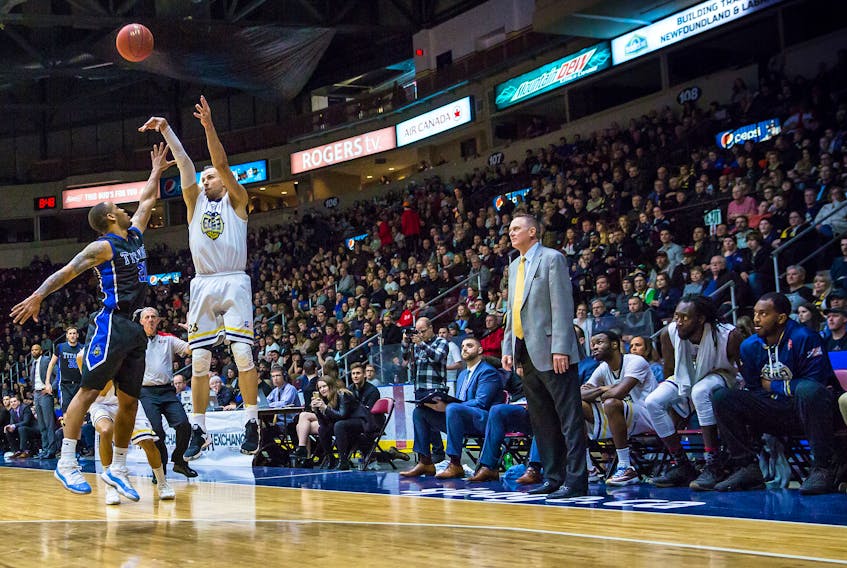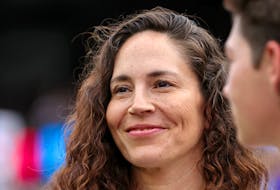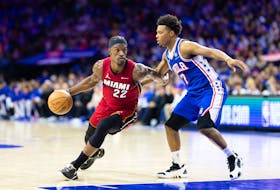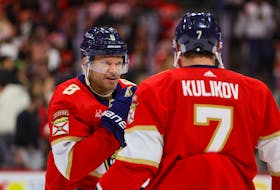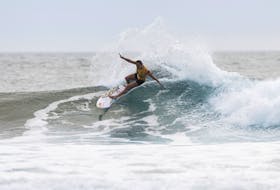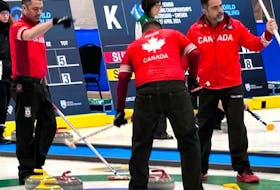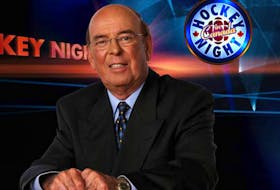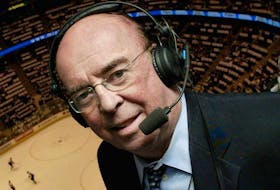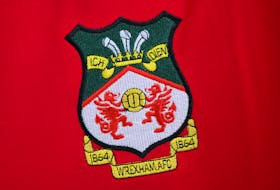By now, his story has been well told, one of a five-year-old boy orphaned along with his four brothers in the mid-1980s, the result of a house fire that killed their parents.
He grew up on the Cape Shore, in the tiny community of Patrick’s Cove, a blip on the highway that hugs Placentia Bay.
His refuge was basketball, and he could often be found — rain or shine, summer or winter — shooting hoops on a crude, homemade net tacked together with a few pieces of two-by-four and fishing net on the side of the road.
Handcrafted three-point and foul-shooting lines took up the two traffic lanes.
From one island to another, he went on to star in United States college hoops, become a staple of Canada’s national team and carve out a fine career in European pro basketball.
Yet here at home, we barely knew Carl English.
“To a lot of people,” he smiles, “I was almost like a ghost.”
Until now.

Basketball is the flavour of the month in St. John’s, thanks to the success of the fledgling St. John’s Edge in the National Basketball League of Canada, a 10-team pro basketball outfit that was foreign to the majority of Newfoundlanders prior to November.
The Edge are among the top two or three teams in the league, and English is driving the bus, and is the face of the franchise who’s leading the league’s scoring parade at the age of 37.
Ghost no more, English is now the man in town, the Mayor of Mile One, a social media magnet, the rock star who’s surrounded by adoring young fans clamouring for his signature after each and every game at home.
It’s been a long time coming.
Selected as Newfoundland and Labrador’s fifth-greatest athlete of all time following an extensive Telegram poll/panel 10 years ago, the province’s sports fans are only now getting to see what all the hubbub was about.
“They’d heard stories that I’d done this, done that, but they’d never seen me play,” English said this week in the dim of an empty Mile One.
“Now I see people in the stands and I’m like, ‘Jeez, that’s so and so’ … people I haven’t seen in a long, long time.
“And I know they’d never be here, only they want to see me play again because they hadn’t seen me since Fatima.”
Carl English is one those special ones, with a unique talent to play a sport.
By Grade 8, he was already a starting guard for Fatima High. In Grade 9 or 10, he dropped 75 points in a single game against an overwhelmed Patriots squad from Mount Pearl’s O’Donel High.
In 1997, he was starting for the province’s Canada Games team in Brandon, Man., a 15-year-old going head-to-head with kids two and three years his senior.
In college, at the University of Hawaii, English would win a Western Athletic Conference MVP award, and berths on the WAC Tournament all-star teams. Twice he led the Rainbow Warriors to the NCAA Tournament.
In the years since college, save for a couple of winters in the NBA Development League in Fort Myers, Fla., and Charleston, S.C., English has forged a career in Europe, making a very good living in Italy, Croatia, Greece, Germany, but primarily in Spain.
In between were stints with the national team, and lining up against some of the game’s best — Kobe Bryant comes to mind — in international play.

“The funniest thing is what my wife said to me about a month into this season,” he says with a wide grin, “when this was really taking off. She said, ‘I don’t understand it. You’ve led countries in scoring for years, you were in the best leagues outside the NBA, played in front of 25,000 every night, and now all of a sudden everybody thinks you’re playing basketball again!’
“That kind of sums it up for me. It’s like my career is born again. Out of sight, out of mind, I suppose.
“There were times I’d go to Toronto and go to the Air Canada Centre and they’d have practice gear and new shoes for me because of the people I know and what I’d done there with Team Canada. And I come down here to The Works (at Memorial University), and they look at me and say, ‘Five bucks, sir.’
“Don’t get me wrong. I don’t mind. I love the fact that you come to Newfoundland, and people probably know who you are, but they don’t really bother you. I like to have my privacy. Overseas, you’re bombarded wherever you go, people taking pictures.”
To believe English has merely had a hand in the success of the Edge is to assume Pavarotti sang karaoke.
English might not be the sole reason, but he’s been a large part in the Edge’s attendance, which is second-highest in the league and why over 4,000 fans have flocked to Mile One on a couple of occasions.
And he’s loving every minute of it, embracing his new-found celebrity and running with it.
“I felt if I got involved,” he said, “I could help in a lot of ways, from being a local guy to where I’ve played and the things that I could incorporate to the team.
“But to come out and say we were going to get 4,000 a game, and yeah I was going to lead the league in scoring, and yeah the team was going to be at or near the top of first place, they would have been hard things to envision.
“I like to say it’s a perfect storm coming together, but in a good sense.”
English remembers travelling to town in high school, Gord Pike loading the Royals on to a bus and heading east. They used to head over to the MUN varsity games back then, back in the Peter Benoite and John Devereaux era, when the Sea-Hawks played in front of a full house.
But the old MUN gym was a high school gym, really.
Since then, the Sea-Hawks have done OK at the gate in the Field House, but nothing to write home about.

St. John’s, frankly, was not a basketball town.
Until now.
Maybe it’s the newness of pro hoops, that it’s cool to be seen at an Edge game. Perhaps it’s because of the inviting ticket prices, or maybe it’s because there’s not just a whole lot of options on the St. John’s sporting landscape.
Whatever it is, English isn’t complaining. The NBL Canada and the Edge boast a high-tempo game, a track meet that often ends in double-digit numbers on the scoreboard.
And English, despite his 37-year-old legs, hasn’t missed a step.
He’s still in very good shape — he’s a savage in the gym and weight room during the off-season — with only the thinning hair hinting at his age.
“No,” he offers flatly when asked if he’s surprised even himself with his play this season, and a few days after draining 58 points against the KW Titans, a career single-game high (in the pros) and an NBL Canada record.
“I’ve been at this level my whole career. Being over in Europe, not a lot of people know that. I’ve been the leading scorer or top five in every league I’ve played in around the world.
“For me, this has been my level.”
These are fun times for English, playing at home where his family — wife Mandy, his high school sweetheart, and kids Ryder, 9, Kirsten, 8, and Kylie, 3 — sit courtside every night.
It’s part of what keeps him here. The kids are settled, in school and in their own activities (Ryder plays hockey).
Just last week, English says he received two offers from overseas teams — “for probably double what I’m making here” — but home is where the heart is.
But performing at home brings a certain amount of pressure, too, pressure to perform every night he hits the court.
“I want to make this work so bad,” he said, “and I want to win so bad. It’s a part of me because it’s Newfoundland. You see so many people in the stands that you know, and you see them later at the hockey rink or wherever. You’re like, ‘Oh man, this is special.’ But it puts a bit of weight on your shoulders.”
English is not immune to the pressures of the game, and certainly not hardship away from the court. There was the loss of his parents, and years later, his uncle, Junior McGrath, who along with wife, Betty, basically raised Carl.
Junior and Carl had been out fishing. After bringing their catch to shore, Junior collapsed from a heart attack and died on the wharf. That was almost 20 years ago.
Basketball was, again, English’s sanctuary, but even that brought a certain degree of heartache.

On a late June evening 15 years ago in downtown Toronto, a gathering of friends and family — not to mention a large turnout of media — convened in the trendy, but now-closed, Indian Motorcycle Club in downtown Toronto, a fly ball from SkyDome, for the NBA Draft.
English had decided to forgo his fifth year at Hawaii and declare himself eligible for the Draft. Some insiders suggest he wasn’t ready for the NBA. Rainbow Warriors coach Riley Wallace implored him to play his fifth year.
A couple of mock drafts had English pegged as a second-rounder; he was convinced he was first-round material.
I still picture English, dressed in nice a cream-coloured suit, sitting on a sofa in the lounge with his then-girlfriend, now-wife.
After the Cleveland Cavaliers made some high schooler by the name of James the first overall pick, one by one the names were announced on the television screen. The first round came and went, 29 names, and no Carl English.
Same with the second round, and English, clutching Mandy’s hand, seemed to sink lower into the sofa.
It was gut-wrenching watching it unfold.
Jamal Magloire, a Toronto native and by then an NBA player, came out for the big night, and even he didn’t know what to say.
The Toronto Raptors were making their second pick, 52nd overall, and there was some hope they might use it on English.
Instead, the Raps took an unknown Dutchman by the name of Remon van de Hare (who would never play in the NBA, by the way).
Six more teams would make their selections. English was not one of them, and slowly the bar emptied in a sullen mood as folks shuffled out into the Toronto night.
English did a good job keeping it together, speaking of his option now that he was a free agent. But the disappointment written across his tanned face was unmistakable.
He would try to get to the NBA, but its summer league and invites to training camps for the Seattle SuperSonics and Indiana Pacers would be all he could muster.
“The things that haunts me, and probably always will haunt me, is that when I got good enough to go (to NBA), I was overseas. But with the job offers I got (10-day tryouts and such), I would have had to take a pay cut to go back to the States.
“What I regret is not taking those NBA offers and giving it my full attention.”
As with anything in life, timing is everything.
English thought he had something with the Pacers, who brought him into Indiana and worked him out through the summer of ’03. He even saw some action in the pre-season, but was eventually cut.
“It was great when I got there,” he said, “but then they fired Isiah Thomas (as coach). Isiah had been working with me every day. I was his guy.
“But the new coach (Rick Carlisle) came in with his guys and I got pushed aside. And that’s professional sports. I’ve seen it for the past 15 years.”
No one knows better than English that hindsight is 20-20. If he had his time back, he would have accepted one of those tryouts from the NBA after gaining some financial security with a couple of European contracts.
“I always had training camp offers — I could go to a (NBA) camp next year — but when you go to camp with a $100,000 bonus, you have a better chance than the guy who has no guarantee.
“Kobe Bryant and these guys, they sign in June and July. The Carl Englishes of the world will sign in September or October. But in Europe, I sign in June or July. So if I turned down those European offers and waited for the NBA stuff, I was putting myself in limbo in that something might not come.
“And the other problem is I had two young kids at the time, and once you try the NBA and get cut in October or November, I could end up in a country where I’d never played. And now you’re taking your family to Russia or to a country that’s maybe not so safe.
“So there were a lot of considerations that had me wondering what I should do or what I should not do.
“All that said, it will haunt me for who I am forever. Don’t get me wrong, I’m happy with how it’s all turned out, but that’s one thing that I wished I had really, really tried.”
If that regret No. 1, his choice of agents is 1A.
If there was one critical error English made in his career, it was hiring Harold Cipin and George Duffield, from an outfit known as Slingshot Management International, or SMI, in Toronto to represent him.
Red flags were raised on draft night when Cipin told me he represented one other basketball player, Toronto’s Jerome Robinson. Robinson was, Cipin said, playing overseas but the agent could not recall the country.
After some digging a month or two later, I discovered Cipin actually worked for a property management company, and apparently dabbled in the player agent field on the side.
It was Cipin who had organized the draft night debacle without really knowing if English was going to be selected, and who issued a news release later that summer stating that English had signed a two-year guaranteed contract with the Pacers for close to $1 million.
Nothing could have been farther from the truth.
English, who was young and naive at the time, could not be blamed for the mismanagement.
“That’s the biggest mistake,” he sighs with a roll of the eyes. “A lot of times in your career, you don’t know who to trust. I’m coming from a small town, 20 to 30 people, and you trust everybody. That was my biggest downfall, trusting the wrong people and that’s what really screwed me.”
For the past dozen years, he’s been represented by Andrew Vye of YouFirst SPORTS, the same agency that has Kyle Lowry and Serge Ibaka of the Raptors, and Kristaps Porzingis of the New York Knicks.
“If I had a guy like Andrew coming out of college, he would have known, ‘Carl, you’re projected at 21, but I got you a lock at 35 (in the second round). I think you should go back to school.’ Or, ‘This is where we’re at: if you slip to 28, I have a deal done already. Do you want to roll the dice?’ Then it’s my decision.
“The lowest I was projected was 37. How do you go from 37 to being undrafted? But, when I look back on it, I could have said, ‘Screw this, I’m done with this. This happened to me, that happened to me, this is not fair, that’s not fair.’
“It would have been easy to give up. But you can never give up.”
The whole NBA thing and the draft are long behind him now. He’s enjoyed a wonderful career, made a good dollar and is probably headed for the Canada Basketball Hall of Fame.
He’s not sure what the future brings — he’ll wait until the summer before figuring out if he’ll play again next season — but he’s sure he’d like to remain with the team in some capacity.
Carl English, it seems, is home for good.
Robin Short is The Telegram’s Sports Editor. He can be reached by email [email protected]

